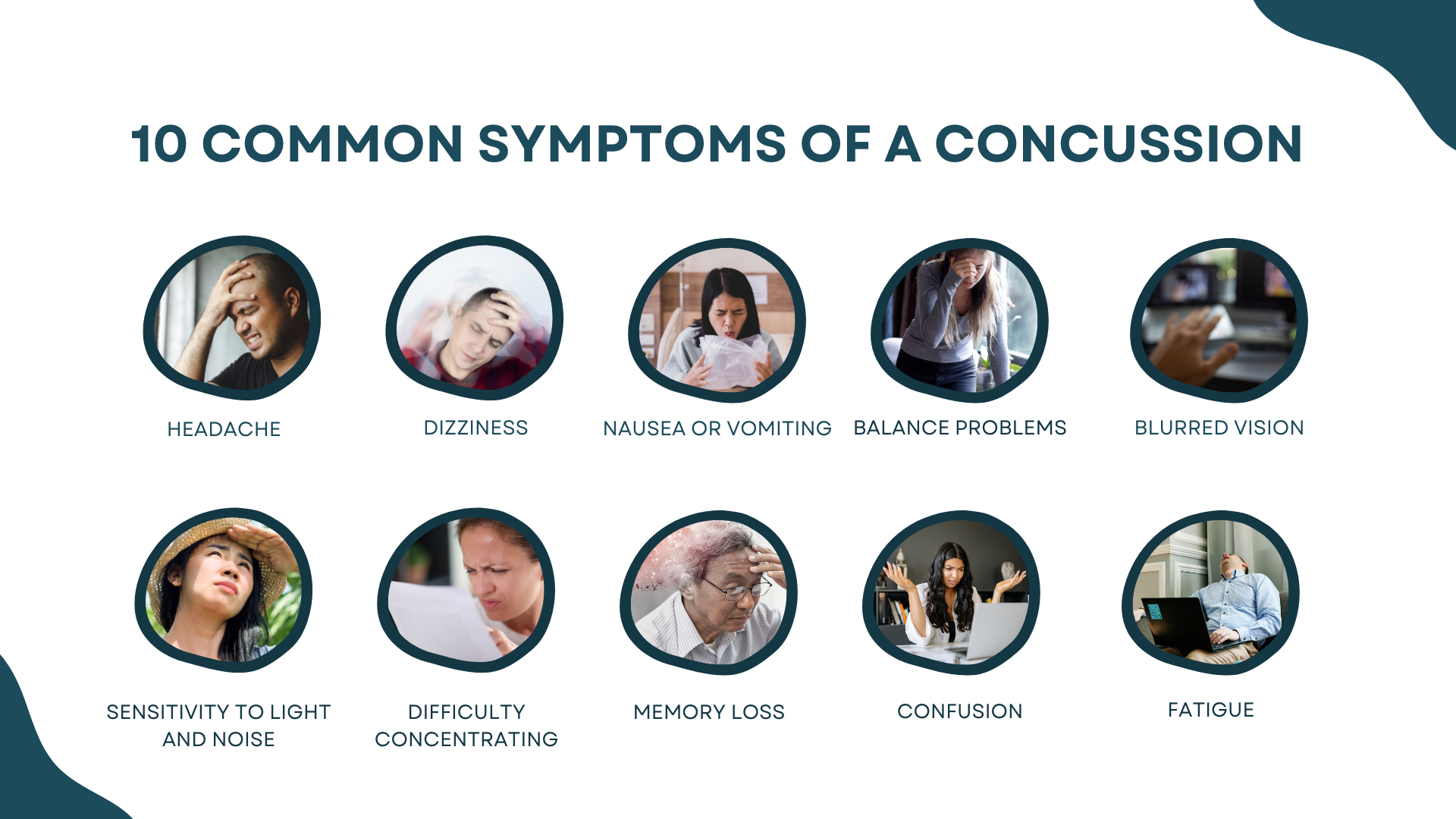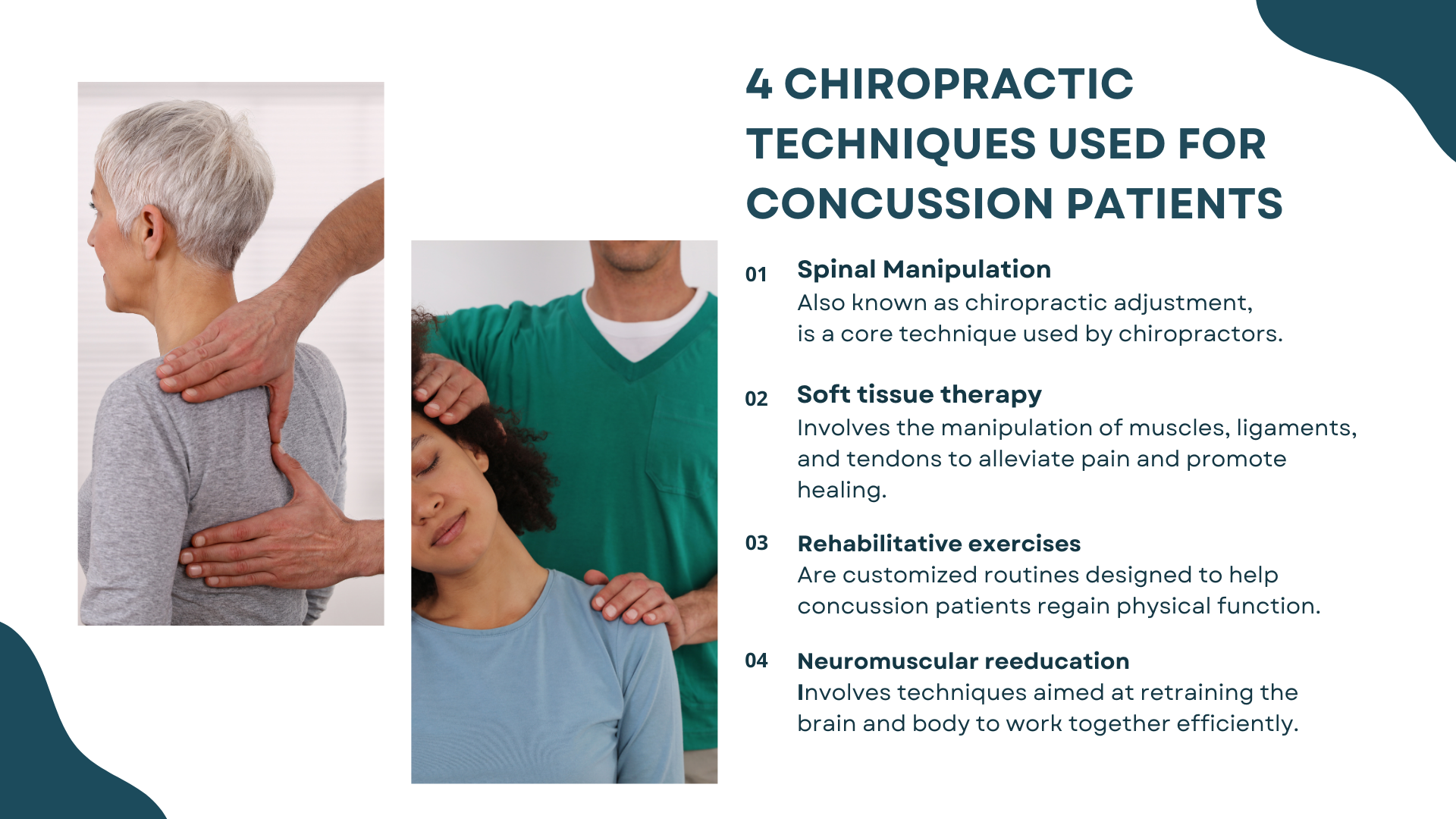Concussions are a common yet often misunderstood type of traumatic brain injury.
Frequently resulting from sports accidents, falls, or car crashes, they pose significant health risks if not correctly identified and managed.
Chiropractors, known for their expertise in musculoskeletal health, frequently encounter patients with head and neck trauma.
This raises an important question: Can a chiropractor diagnose a concussion?
So, what is the chiropractors’ role in recognizing and managing concussions? Let’s explore their methods and the benefits of chiropractic care in post-trauma recovery.
What Is a Concussion?

A concussion is a type of traumatic brain injury (TBI) that occurs when the brain is jolted or shaken within the skull. This can happen due to a blow to the head, a fall, or any incident that causes rapid head movement. Concussions disrupt normal brain function and can vary in severity. They are often associated with sports injuries, car accidents, and falls, making them a common issue in both athletic and general populations.
How Does a Concussion Affect You?
Concussions can have a wide range of effects on an individual. Physical symptoms may include headaches, dizziness, and balance problems. Cognitive symptoms can manifest as memory issues, difficulty concentrating, and confusion. Emotional symptoms might involve irritability, depression, and anxiety. These effects can be temporary or, in severe cases, long-lasting, significantly impacting daily life and overall well-being.
10 Common Symptoms of a Concussion

Concussions can manifest through a wide range of symptoms that impact physical, cognitive, and emotional well-being. Understanding these symptoms is crucial for early detection and effective management.
Headache
Headaches are one of the most common symptoms following a concussion. They can range from mild to severe and may be persistent. These headaches often result from the brain’s response to the injury and associated neck strain and muscle tension.
Dizziness
Dizziness or vertigo can occur when the brain is disrupted in processing spatial orientation and balance. Patients may feel lightheaded or unsteady, significantly affecting their daily activities and increasing the risk of further injury from falls.
Nausea or Vomiting
Nausea and vomiting are frequent symptoms, particularly in the immediate aftermath of the injury. This is often due to the brain’s impaired ability to regulate the autonomic nervous system, which controls digestive functions.
Balance Problems
Balance problems are common in concussion patients due to the brain’s role in coordinating movement and maintaining equilibrium. This can manifest as difficulty walking, stumbling, or a general sense of instability.
Blurred Vision
Blurred vision or other visual disturbances, such as double vision, indicate the brain’s difficulty processing visual information. This can make tasks like reading or driving particularly challenging.
Sensitivity to Light and Noise
Many concussion sufferers experience increased sensitivity to light (photophobia) and noise (phonophobia). These sensitivities can exacerbate headaches and contribute to a sense of overwhelming discomfort in bright or loud environments.
Difficulty Concentrating
Cognitive symptoms, such as difficulty concentrating, are common after a concussion. Patients may find it hard to focus on tasks, follow conversations, or retain new information, impacting work, school, and daily responsibilities.
Memory Loss
Memory loss, or amnesia, can occur when people forget the events leading up to, during, or after an injury. This can be distressing and disorienting, affecting their ability to recall important information or experiences.
Confusion
Confusion is another cognitive symptom in which patients may feel disoriented or struggle to understand what is happening around them. This can lead to difficulties in decision-making and communication, further complicating recovery.
Fatigue
Fatigue is a prevalent symptom resulting from the brain’s increased effort to heal and process information. Concussion patients often feel unusually tired and may require more sleep than usual, yet still experience persistent exhaustion.
How Does a Concussion Differ from Other Head Injuries Like Whiplash?

Concussions are distinct from other head injuries, like whiplash, in their mechanism and impact. Unlike contusions or skull fractures, which involve physical damage to the brain or skull, concussions are more about the functional disruption of brain activity. While other head injuries might show up on imaging tests, concussions often do not, making them harder to diagnose without a thorough clinical evaluation.
Can Chiropractors Diagnose Concussions?
Chiropractors are trained to recognize the signs and symptoms of concussions, particularly those associated with whiplash injuries from car accidents. While they can identify concussion symptoms and provide initial care, they often work in conjunction with neurologists and other specialists for a comprehensive diagnosis. Chiropractors can play a crucial role in the early detection and management of concussions, helping to mitigate long-term impacts through timely intervention.
What Role Do Chiropractors Play in Managing Post-Concussion Syndrome?
Post-concussion syndrome (PCS) refers to the persistence of concussion symptoms beyond the typical recovery period. Chiropractors can be instrumental in managing PCS through various techniques that address neck pain, headaches, and cognitive impairments. Their approach often includes manual therapies, rehabilitative exercises, and lifestyle advice to promote recovery and enhance the quality of life.
4 Chiropractic Techniques Used for Concussion Patients

Chiropractors employ various techniques to help patients recover from concussions. These techniques are designed to address the wide range of symptoms associated with concussions and to promote overall health and wellness.
Spinal Manipulation
Spinal manipulation, also known as chiropractic adjustment, is a core technique chiropractors use. This involves the application of controlled force to the spinal joints. For concussion patients, spinal manipulation helps to:
- Improve spinal function: Proper spine alignment is crucial for overall body function. Misalignments, particularly in the neck, can contribute to pain and hinder recovery.
- Alleviate pain: By realigning the spine, chiropractors can reduce pressure on nerves and relieve pain, particularly in the neck and back, which are commonly affected by whiplash injuries that often accompany concussions.
Soft Tissue Therapy
Soft tissue therapy manipulates muscles, ligaments, and tendons to alleviate pain and promote healing. Techniques such as massage, trigger point therapy, and myofascial release are commonly used. For concussion patients, soft tissue therapy can:
- Reduce muscle tension: Head and neck injuries often result in muscle tightness and spasms. Soft tissue therapy helps to relax these muscles, reducing pain and discomfort.
- Improve blood flow: Enhanced circulation helps to deliver nutrients and oxygen to the affected areas, speeding up the healing process and reducing inflammation.
- Relieve headaches: Tension headaches, common after a concussion, can be alleviated through targeted soft tissue therapy, which addresses the underlying muscle tightness.
Rehabilitative Exercises
Rehabilitative exercises are customized routines designed to help concussion patients regain physical function. These exercises focus on:
- Restoring balance: Concussions can disrupt the body’s sense of balance. Specific exercises help patients regain their equilibrium and reduce the risk of falls.
- Improving coordination: Concussions can impair coordination. Rehabilitative exercises are tailored to help patients restore their ability to perform coordinated movements effectively.
- Building strength: A concussion can result in muscle weakness, particularly in the neck and core. Strengthening exercises help rebuild these muscles, supporting overall recovery and reducing the likelihood of future injuries.
Neuromuscular Reeducation
Neuromuscular reeducation involves techniques to retrain the brain and body to work together efficiently. This is particularly important for concussion patients experiencing symptoms such as dizziness and balance problems. Neuromuscular reeducation includes:
- Balance training: Exercises designed to improve the body’s balance mechanisms, helping patients feel more stable and reducing the risk of falls.
- Proprioception exercises: These exercises enhance the body’s ability to sense its position in space, which is often impaired after a concussion. Improved proprioception aids in better movement and coordination.
- Vestibular rehabilitation: For patients with vertigo or dizziness, vestibular rehabilitation exercises target the inner ear and brain pathways that control balance and eye movements. This helps to alleviate symptoms and improve overall stability.
By utilizing these chiropractic techniques, chiropractors provide comprehensive care that addresses the multifaceted impacts of concussions. This holistic approach not only aids in symptom relief but also promotes long-term health and well-being, ensuring that patients can return to their daily activities with improved function and reduced pain.
Why Should You See a Chiropractor after a Head Injury?
Seeing a chiropractor after a head injury can be beneficial for several reasons. Chiropractors are adept at identifying and managing musculoskeletal issues that often accompany concussions, such as neck pain and headaches. Their holistic approach to care, which includes non-pharmacological pain management and rehabilitative strategies, can be crucial in promoting recovery and preventing long-term complications.
Does Chiropractic Care Treat Other Traumatic Brain Injury Symptoms?
Yes, chiropractic care can be effective in treating symptoms associated with other traumatic brain injuries (TBIs). Beyond concussions, TBIs can include conditions like diffuse axonal injuries and hematomas, which may result in chronic pain, mobility issues, and cognitive impairments. Chiropractors use various techniques to address these symptoms, aiming to enhance overall brain function, reduce pain, and improve the patient’s quality of life.
Explore Chiropractic Care for Your Concussion Recovery!
At Bergen Chiropractic and Sports Rehabilitation Center, our chiropractic team, led by Dr. Gregory Doerr, adheres to the highest medical standards to provide superior chiropractic care.
Our mission is to provide unparalleled patient care in a comfortable, healing atmosphere.
Access our contact form or call us at (201) 945-4075 to learn more about our chiropractic care services!
Our offices at 532 Anderson Avenue, Cliffside Park, NJ 07010, and 62 Summit Ave, Hackensack, NJ 07601, are ready to welcome you as we proudly serve the areas of New York, New Jersey, Philadelphia, PA, and Baltimore, MD. Also, access our blog, Facebook, and Instagram pages for more information on chiropractic care for post-concussion syndrome symptoms!








